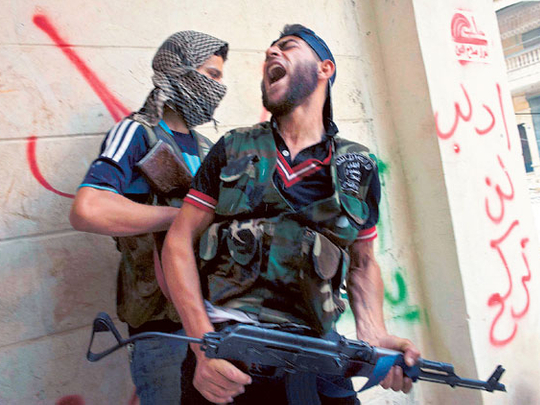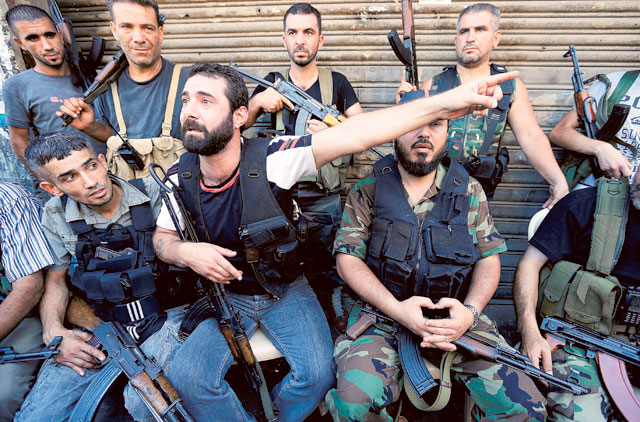
Aleppo: With the thud of heavy machine guns, the whipping sound of sniper rounds and the smell of cordite filling the midnight darkness, the rebels almost didn’t notice her veiled figure turning the corner.
They dragged her behind the thick limestone wall of a centuries-old house in Jdeideh, one of the most recent frontlines in the war-ravaged Syrian city of Aleppo, and asked her for identification.
“What is a woman doing, walking by herself in the middle of the shelling at this time of night,” one of the rebels asked her.
Jdeideh is an old and rich neighbourhood, home to part of the city’s Christian community and with straddling political allegiances. Rebels claim to have seized three quarters of the area since the weekend.
The woman’s body language was shifty and the story of her sick son unconvincing. Abu Mohammad, the local rebel unit leader, decided to take her back to base, barely one hundred yards down the street, for further interrogation.
Amira sat cross-legged, arms wrapped around her waist and compulsively twitching her foot as Mohammad sent for residents who might recognise her.
When he found pictures and songs to the glory of President Bashar Al Assad in her phone, he had to restrain some of his men from insulting her.
She started crying but remained defensive and swore she was an opposition supporter.
Abu Mohammad dialled the last outgoing number on her phone and posed as a Syrian army officer who had stopped the young woman at a checkpoint because he suspected her of spying for the rebels.
The man who picked up was from state security. “No, that’s fine, let her go. She’s with us, she’s providing us with information on rebel positions.”
Amira was given a glass of water and taken to another room in the elegant early Ottoman era house where the unit had set up camp a day earlier.
Sitting on the wall of the fountain in the middle of the inner courtyard, Mohammad, a balding 42-year-old, held his head in his hands.
“What can I do with this woman? She’s spying for the regime but we cannot keep her here. It’s against our religion, even if she is with the shabiha,” he said, referring to Syria’s loyalist militias.
“I cannot even search her. How do I know she is not planting electronic markers on our positions for the regime’s MiG fighters to bomb us? We received some intelligence that women were being used to do that.”
Hossam Amin, one of the fighters in the group, agreed: “She cannot sleep here, it’s not right. The honour of many families will be destroyed.”
Eventually, Amira was walked back to her sister’s nearby home and picked up the next morning for the interrogation to resume.
“Had she been arrested by Syrian regime soldiers, what do you think would have happened to her? Do you know many rebels who treat captured women like us?”













